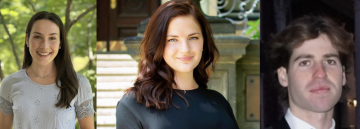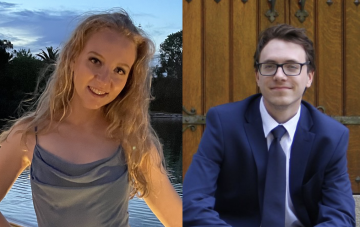2021-22 REEESNe Essay Competitions
The Russian, East European, & Eurasian Studies Northeast network initiative instituted and ran competitions for three prizes in spring 2022, announce the winners of its 2021-22 Student Essay Competitions over the summer. Prizes of up to $1,000 were awarded for the top essays in three categories: Master’s-level long-form scholarly essays, Undergraduate-level long-form scholarly essays, and Open-level short-form essays (which may be scholarship or public-facing pieces).
The Marina Ledkovsky Prize for best short-form essay by an undergraduate or Master’s student honors a well-loved professor of Russian language and literature. Long respected as a Turgenev scholar, Dr. Ledkovsky (1924-2014) received her PhD at Columbia University and subsequently taught there and at Barnard College, while her work within and about the Russian Orthodox Church and her editing in collaboration with Charlotte Rosenthal and Mary Zirin of the influential Dictionary of Russian Women Writers (Greenwood, 1994) put her knowledge to significant use beyond academia, demonstrating the impact that short, targeted, well-evidenced writing can have on public understandings of arts and institutions. The winner of this year’s Ledkovsky Prize is Binghamton University’s Lea Frenkel (undergraduate), whose essay “Depictions of Estrangement in Soviet Society in 20th Century Russian Literature” provides new insights into how literature, and particularly Nabokov’s and Erofeev’s writings, articulated the difficulties in achieving a shared sense of belonging within the intensive normalization of values in Soviet society. Honorable mention goes to Hunter College’s Nicole Gonik for the essay “Charlotta: A Character Without a Past.”
The Carlos Pascual Prize for best long-form essay by a Master’s student is named for the former U.S. Ambassador to Ukraine (2000-2003) and to Mexico (2009-2011). The career that Ambassador Pascual built following his Master’s degree from Harvard, his work in several State Department positions relating to Europe and Eurasia, and the research and communications initiatives that he oversaw to authenticate the tapes of then-president of Ukraine Leonid Kuchma all speak to the ambitions, vision, skills, and dedication that REEESNe seeks to help its member institutions to cultivate and reward in their Master’s students. The winner of this year’s Pascual Prize is Columbia University’s Madison Sargeant, whose essay “Historical mythmaking and defense: Katyn, Smolensk, and Polish defense policy in the 2010s” develops a novel “open wound” theoretical framework in order to relate Polish defense spending and rhetoric back, not to the frequently cited 2008 Russo-Georgian War, but to a narrative arc bridging the 1940 Katyn massacre to the 2010 Smolensk plane crash. Honorable mention goes to Lehigh University’s Keenan Overa for the essay “Apathy, Despair, or Opportunism? Analyzing Russian Geopolitics in the Arctic in the Face of Climate Change.”
The James Billington Prize for best long-form essay by an undergraduate student is dedicated to the Unites States’ 13th Librarian of Congress (1987-2015). A widely published historian of Russia, prior to heading the Library of Congress Dr. Billington (1929-2018) received degrees from Princeton University and the University of Oxford, taught at Princeton and Harvard University, and directed the Woodrow Wilson International Center for Scholars, where he founded the Kennan Institute for Advanced Russian Studies. The winner of this year’s Billington Prize is Patrick Cantwell (College of the Holy Cross), whose essay “Pipe Dream: Natural Gas, Nord Stream 2, and Russia’s Natural Gas Strategy” provides a rigorously argued analysis of the collision of Russia’s geopolitical aims with Germany’s need for natural gas as framed and mobilized under several recent periods of economic, industrial, and political leadership. Honorable mention goes to Hunter College’s Nicole Gonik for the essay “Borders in Mikhail Lermontov’s A Hero of Our Time and ‘The Demon.’”

